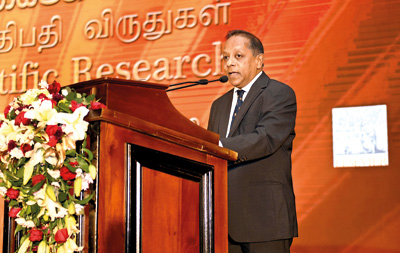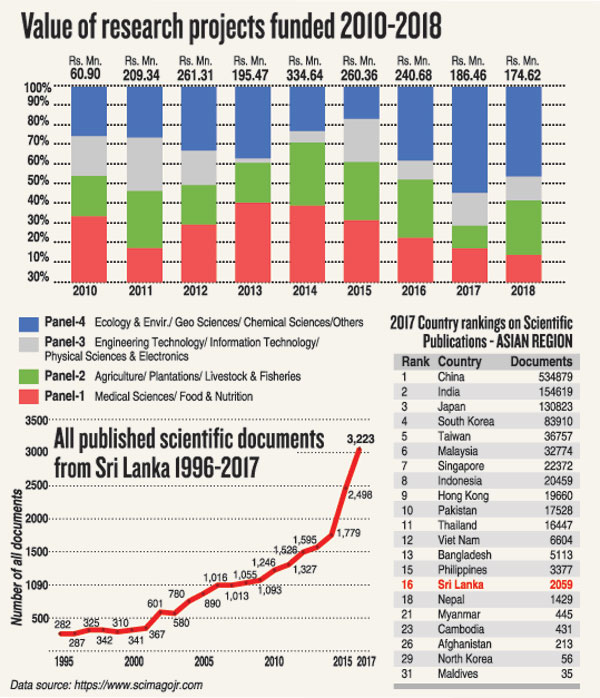News
Researchers rewarded for published, locally-relevant projects
About 240 Sri Lankan scientists involved in 100 different research fields including medicine, agriculture, engineering and basic sciences were honoured at the 12th President’s Awards for Scientific Research.

NRC Chairman Prof.Janaka de Silva addressing the audience
The awards were held in Colombo under the patronage of President Maithripala Sirisena on August 26.
Research peer reviewed and published in internationally recognised journals, is a measure of success of an endeavour. So this was used as a yardstick in selecting the best scientific research.
The President’s Awards for Scientific Research (PASR) is an annual event organised by the National Research Council of Sri Lanka (NRC), an institute under the Ministry of Science, Technology and Research.
“The award scheme was initiated in 2001 to encourage Sri Lankan scientists to increase their research output both in terms of quality and quantity,” said Prof Janaka de Silva, the chairman of NRC, in his speech.
The awards are given two years after the year of publication of a paper or obtaining a patent.
“For example, the achievements in 2017 are given awards in 2019. This provides enough time for completeness of indexing and documentation where publications are assessed,” Prof de Silva explained.
To make it transparent and prevent bias toward any scientific discipline, an internationally acclaimed scoring system was used to rank the scientific publications for the PASR.
“From this year onward, awards are given for a published work rather than to an individual scientist, and all Sri Lankan co-authors with a Sri Lankan institution affiliation of the publication is recognised as recipients of the award,” he explained.
Prof de Silva said that the NRC wishes to encourage research that is conceptualized and performed mainly in Sri Lanka, so the consideration has been given to the level of contribution made by Sri Lankan scientists to the research and publication in instances where there is international collaboration.
“The NRC regularly reviews and revises the selection criteria, with a view of retaining the relevance, and prestigious nature of the awards,” Prof de Silva added.
This year is special. The National Research Council completes 20 years since it was founded in 1999.
NRC was a result of a concept by Prof Arees Kovoor, the first chairman of the institute and the world-renowned scientist, the late Dr Arthur C Clarke. In 2016, the NRC was made a statutory body granting it more powers to operate in promoting science in Sri Lanka through funding and facilitating research.
Scientists can approach NRC with a proposal to obtain funds. There are many research undertakings that became a reality through NRC funding.
Last year 2018, NRC gave Rs 174.62 million for research. Most of these funds were allocated to research on the environment, geo sciences, and chemical sciences.
Five teams of scientists awarded the NRC’s first Target Oriented Research Grants five years ago, revealed their progress and important findings that have national importance.
These included a project to develop polyvalent anti venom for snakebites in Sri Lanka; introduction of two new chilli hybrids that gives higher yields than imported chilli hybrids; introduction of a drought tolerant rice, and increase milk production in dairy cows.
Prof.Indika Gawarammana of University of Peradeniya, who spearheaded the development of local anti-venom for Sri Lankan snake species said that the NRC funding kept the project going.
“But in addition to the funding, NRC also gave our project all important legitimacy and made it a project of national importance. NRC also helped to remove red tape in the process of development of the anti venom,” Prof.Gawarammana said.
Dr.Kalana Maduwage is another researcher from University of Peradeniya who received three awards this year.
Previously. Dr.Maduwage had been honoured seven years for his research.
“I first received the President’s Award in 2005 when I was still a medical student. It was a big achievement for me as a young researcher and a confidence builder that I can produce high quality research,” Dr.Maduwage who also won number of foreign awards, told the SundayTimes.


